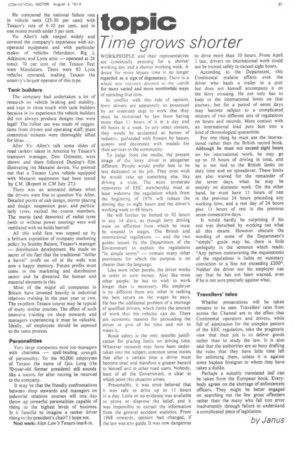topic
Page 33

If you've noticed an error in this article please click here to report it so we can fix it.
Time grows shorter
WORKPEOPLE and their representatives are continually pressing for a shorter working day and a shorter working week. A desire for more leisure time is no longer regarded as a sign of degeneracy. There is a whole new industry devoted to the -search for more varied and more worthwhile ways of spending that time.
In conflict with this tide of opinion, lorry drivers are apparently so possessed by an insensate urge to work that they must be restrained by law from having more than 11 hours of it in a day and 60 hours in a week. In any other context, they would be acclaimed as heroes of industry, garlanded with flowers by beauty queens and decorated with medals for their services to the community.
To judge from the media, the present image of the lorry driver is altogether different. People would prefer him to be less dedicated to his job, They even wish he would rake up something else, like driving a train. The most inveterate opponents of EEC membership must at least welcome the regulation which from the beginning of 1976 will reduce the driving day to eight hours and the driver's working week to 48 hours.
He will further be limited to 92 hours in any 14 days. as though lorry driving were an affliction from which he must be weaned in stages. The British and international regulations -and the two guides issued by the Department of the Environment to explain the regulations "in simple terms" — contain many other provisions for which the purpose is no clearer than the language.
Like most other people, the driver works in order to earn money. Also like most other people. he has no wish to work longer than is necessary. His employer is no different from any other in seeking the best return on the wages he pays. He has the additional problem of a shortage of qualified drivers, which limits the amount of work that his vehicles can do. There are economic reasons for persuading the driver to give of his time and not to waste it.
Road safety is the only sensible justification for placing limits on driving time. Whatever research may have been undertaken into the subject. common sense insists that after a certain time a driver must become tired and therefore a greater hazard to himself and to other road users. Nobody, least of all the Government, is clear at which point this situation arises.
Presumably, it was once believed that it was safe to drive up to 11 hours in a day. Little or no evidence was available to prove or disprove the belief, and it was impossible to extract the information from the general accident statistics, From 1968 onwards, opinion had changed, if the law was any guide. It was now dangerous to drive more than 10 hours. From April 1 last, drivers on international work could not be trusted safely to exceed eight hours.
According to the Department, this Continental malaise affects even the driver who hauls a trailer to a port but does not himself accompany it on the ferry crossing. He not only has to keep to the international limits on that journey, but for a period of seven days may become subject to a complicated mixture of two different sets of regulations on hours and records. Mere contact with an international load puts him into a kind of chronological quarantine.
For one thing he must use the international rather than the British record book. Although he must not exceed eight hours on his international work, he may go up to 10 hours of driving in total, and he is not tied to the British limits on duty time and on spreadover. These limits are also waived for the remainder of the seven days, when he may be entirely on domestic work. On the other hand, he must have 11 hours of rest in the previous 24 hours preceding any working time, and a rest day of 24 hours plus 11 hours of rest in the previous seven consecutive days.
It would hardly be surprising if his rest was disturbed by working out what all this means. However obscure the wording of some of the Department's "simple'.' guide may be, there is little ambiguity in the sentence which reads: "Any person contravening the requirements of the regulations is liable on summary conviction to a fine not exceeding £200". Neither the driver nor his employer can say that he has not been warned, even if he is not sure precisely against what.
Travellers' tales Whether prosecutions will be taken remains to be seen. Travellers' tales from across the Channel are to the effect that Continental operators and drivers, while full of admiration for the complex pattern of the EEC regulation, take the pragmatic view that their job is to deliver goods rather than to study the law. It is also said that the authorities are so busy drafting the rules that they have little time left for enforcing them, unless it is against some hapless foreigner to whom they have taken a dislike.
Perhaps a suitably translated leaf can be taken from the European book. Everybody agrees on the shortage of enforcement officers. They might be better engaged on searching out the few gross offenders rather than the many who fall into error inadvertently through failure to understand a complicated piece of legislation,
by Janus
































































































